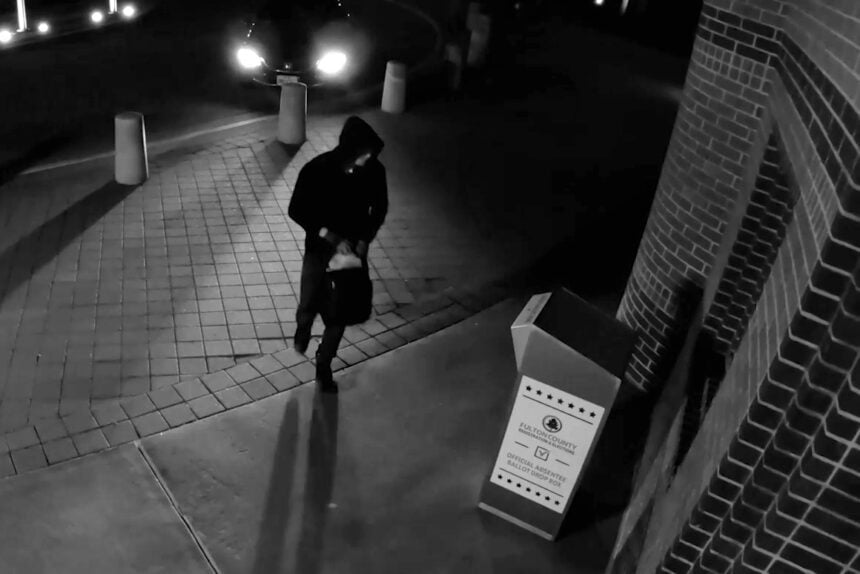2000 Mules
Directed and written by Dinesh D’Souza, Debbie D’Souza, and Bruce Schooley ◆ Produced by Dinesh D’Souza ◆ Distributed by Salem Media Group
It was November 3, 2020. Like most of the world, the United States was in the grip of a new virus, SARS-CoV-2, as well as the draconian measures of response to it enacted by unelected bureaucrats. In addition, a presidential election was in motion and on everyone’s mind. Most Americans were waiting for election results late into the night, when it was starting to look as though Trump would most likely serve a second term as the president of the United States.
But then something strange happened: the pollsters in the swing states simply stopped counting the votes. Most Americans went to bed expecting to wake up to an official Trump victory; instead, they were greeted in the morning by announcements that Joe Biden had won.
We all know what ensued: strange investigations by many actors (some good, some bad) and failure of our institutions and our representatives in Washington to hold accountable the states with significant election irregularities.
Although the election of 2020 is mostly out of the mainstream news now, the problem hasn’t really gone away, as political commentator, writer, and filmmaker, Dinesh D’Souza, makes clear in his new documentary, 2000 Mules (co-written and directed with his wife, Debbie). The film investigates the possibility that the 2020 election was indeed stolen using the strategy of ballot trafficking, which involves the stuffing of collection boxes with fake ballots.
In the film, D’Souza’s main points of contact are Catherine Engelbrecht and Gregg Phillips, of True the Vote, an organization founded to prevent voter fraud. Engelbrecht and Phillips used the method called geotracking (cell phone ping-tracking) to identify a pattern that they determined was indicative of ballot trafficking.
Using the methods of drug cartels as an analogy, Engelbrecht and Phillips explain how the entire process works. There are several central locations where the ballots are picked up by individuals—known as “mules”—and then deposited into different ballot boxes. It is in this transfer that the mules are, allegedly, able to stuff the new boxes with extra ballots.
True the Vote says it acquired hundreds of terabytes of transferred data, obtained surveillance videos through open records requests. The videos and the cell-phone location points for some of the mules indicate a “pattern of life,” which led Engelbrecht and Phillips to conclude that the election was compromised.
D’Souza’s film also includes commentary from his colleagues in conservative media—Eric Metaxas, Sebastian Gorka, Dennis Prager, Larry Elder, and Charlie Kirk—in the discussion. Naturally, all five mostly align with D’Souza’s view, which in and of itself is not bad, but it does create a political echo chamber, despite an inclusion of Prager’s initial, though affected, skepticism about the compromised election.
D’Souza also interviews attorney Hans von Spakovsky, of the Heritage Foundation, who offers important and intelligent insights into election reform and into the ways voters are nudged, persuaded, or even forced to vote a certain way. This is especially true of Americans who are elderly or homeless or for whom English is a second language.
2000 Mules correctly asserts that there are signs that the 2020 election was compromised. What becomes apparent in the film, especially in the footage of the alleged mules provided by True the Vote, is that their were many highly suspicious activities on election night. After all, why would anyone be sheepishly looking around while dropping off ballots at a voting site at 3 a.m.? It is another thing, however, to say that this activity proves that the rightful president of the United States is Donald Trump rather than Joe Biden. It’s not clear in the film whether D’Souza’s objective is to make that case, or whether he’s simply drawing attention to the fragility of U.S. election integrity and its susceptibility to tampering.
The effect of the film thus is to leave us with a rather depressing unanswered question: Do the American people truly have power over electing public officials, or have fixed elections made voting utterly meaningless? For Americans who already think that the election was stolen, 2000 Mules will provide another proof for their already-established belief. Such confirmation offers little remedy, however, when nothing is being done about the situation by those who have the authority to act.
Americans who think that the election was not stolen and that Biden was fairly elected will dismiss the entire documentary, as they already have. All this is not to say that D’Souza shouldn’t have made this film. On the contrary, it adds another chapter to the chronicle of suspicious election-night events, but the matter of the stolen 2020 election remains unresolved.
Image: A still from the film 2000 Mules showing surveillance footage of an alleged ballot-stuffing “mule” in Fulton County, Georgia. (Dinesh D’Souza)

Leave a Reply